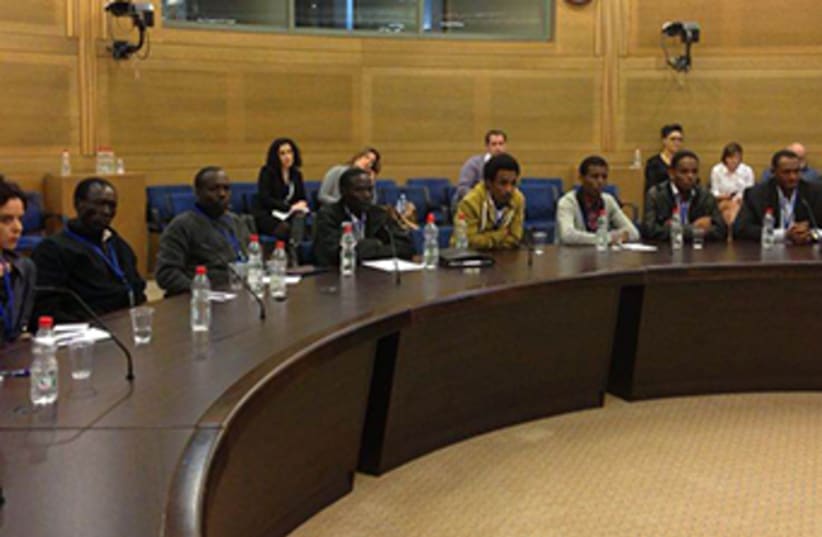Leaders of the African migrants’ protest movement testified to the Knesset Committee on Foreign Workers on Wednesday, a week after they were denied entry to the legislature.“It’s interesting that just a week ago Knesset Speaker Yuli Edelstein considered these asylum-seekers a threat to public order and violent,” committee chairwoman Michal Rozin (Meretz) said.“Today, they sat like anyone else in this committee. This farce shows that the Knesset speaker’s decision last week, at the instruction of an MK from his party [the Likud], was racist. That, and not [migrants] who want to speak to us, is the real danger to democracy.”
Adding a dig at Knesset Interior Committee chairwoman Miri Regev (Likud), who last week asked that the migrants not be allowed to enter the building, Rozin added: “There was unbelievable quiet and order here, unlike Interior Committee meetings, for example.”The Knesset Speaker’s Office explained that Edelstein did not allow the migrants in last week because thousands of them were protesting outside and he felt there was a danger of provocations. However, migrants entered the Knesset in the past and will continue to do so in the future.In the Foreign Workers Committee meeting, one of the migrants, named Jacob, said he wants a real solution to their problem.“No person can live here while being called a cancer, kushi [a derogatory term for a black person], inhuman, and then the government sends him to jail. People who returned to Sudan are in jail or dead,” Jacob said.Mussa, another migrant, said he cannot go home to his country, because there is a civil war.“Everyone is sure we’re just here to work, but not everyone who comes from Africa is poor and needs a job. Some have money but they couldn’t stay where they were,” Mussa said.MK Ayelet Shaked (Bayit Yehudi) said that the newest law dealing with migrants will help him, because it requires requests for refugee status to be examined within six months. Before, there was no time limit.Shaked added, however, that “Israel cannot be the solution to the entire continent of Africa’s problems. I think most Israelis are good people and not racists, but we have our own problems. Still, if someone is declared a refugee, he or she can stay here. The rest should go back where they came from.”Rozin called for the government to review the migrants’ requests for refugee status and improve conditions for those in the Holot holding facility in the South.Shai Berman, director-general of the Restaurant, Bars and Cafes Union, said migrants need to be given work permits, estimating that 10,000 of them are employed in restaurants, which would go out of business without them.Shaked asked what restaurateurs did before 2007, when illegal migrants began coming to Israel from Africa. Berman responded that work permits were given to people from India, Ghana and Nigeria, who came for short periods.However, Yossi Edelstein head of the foreigners department in the Population, Immigration and Borders Authority, said that is not accurate.“Until 2007, you employed Beduin and Palestinians. I think that’s what you should do now. Give jobs to the needy in our area,” Shaked told Berman.Migrants testify in Knesset, a week after being refused entry
Meretz MK accuses Knesset speaker of racism; Edelstein: Circumstances changed since last week.
